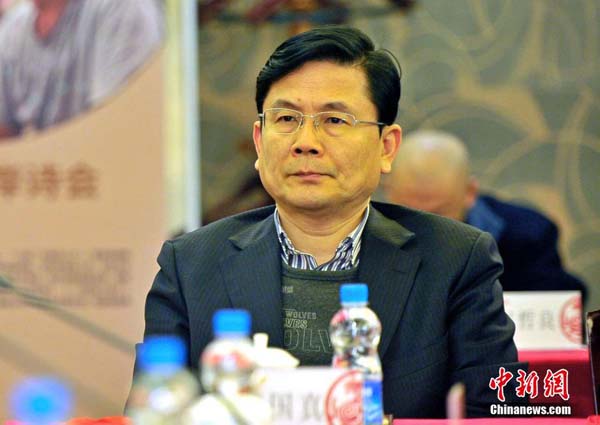Popular poet Wang Guozhen dies at 59
- By Zhang Rui
 0 Comment(s)
0 Comment(s) Print
Print E-mail China.org.cn, April 27, 2015
E-mail China.org.cn, April 27, 2015
| The file photo shows Chinese poet Wang Guozhen attending an event. [Photo: Chinanews.com] |
The once super-popular poet Wang Guozhen died on Sunday morning of liver cancer in Beijing. He was 59.
Wang, a poet and painter with whose works generations of young Chinese grew up, died at 2:10 AM on Sunday, his family members confirmed to China News Service. After the news broke out, millions of people started to mourn him on the Internet.
"He was an unsophisticated and sensitive person in the literary world," Wang's friend, historian Jia Yinghua remembered. "Wang loved innovation, and he was energetic."
Huo Junming, a critic, said Wang was one of the most controversial poets ever in China, "His poems were very much like proverbs and adages, and his style was sentimental and romantic about youth. We must admit that his style influenced many students and campus poets in the 1980s and the 1990s."
Wang was born in Beijing on June 22, 1956 and started writing poems in 1985. His first collection of poems, "The Youth Tide," was published in 1990 and sold more than 600,000 copies, starting the Wang Guozhen phenomenon that has continued ever since. Young students often copied his lines by hand and treasured them as personal mottoes, and even recited and used them when making friends or falling in love. Wang was even called "Prince of Poetry."
His success may be attributed to two main reasons: His words and images are simple and easy to comprehend, and they evince an inspirational spirit and optimistic attitude toward life. But some critics and fellow poets attacked him, saying that Wang's works were common, shallow and inelegant, lacking much high artistic value at all.
Li Shaojun, deputy editor in chief of Poem Magazine, said Wang's poems were easy to read and understand and catered to popular culture and public interests. "It’s hard to call his poems the peak of poetry, but they are full of youthful energy, ideals and vision for the future. In contemporary terms, his poems are full of positive energy."
After he became famous, Wang started a career in painting, calligraphy and traditional music. His calligraphy has been inscribed and engraved at dozens of national scenic spots in China.
Even Chinese President Xi Jinping quoted Wang's poetry. In his remarks at the 21st APEC Economic Leaders' Meeting in Bali, Indonesia on Oct. 8, 2013, Xi said, "No mountain is higher than a (climbing) human, and no road is longer than a (walking) foot."
It was reported that Wang’s memorial service will be held on April 30 in Beijing.







Go to Forum >>0 Comment(s)